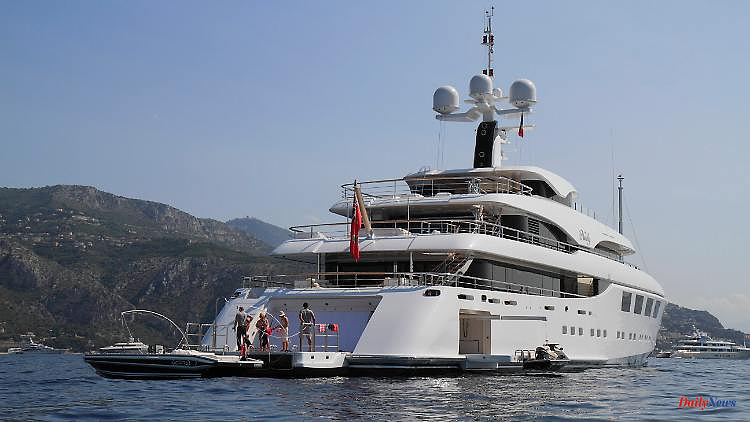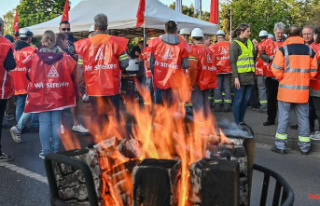Sanctions following Russia's invasion of Ukraine will freeze billions worth of Russian super-rich. But the private jets and luxury yachts are just the visible symbols of their wealth. "Russian elites and oligarchs are probably among the best in the world at hiding their wealth," says a US official.
Superyachts have long been the favorite way for Russian billionaires to flaunt their wealth. After all, not everyone could buy a top football club like Roman Abramovich did with Chelsea. And with the floating status symbols, often built in German shipyards, the super-rich could compete in size, luxury and ostentation. A boat has six decks and a pool? Nothing that couldn't be topped with eight decks, two helipads instead of one, or the aesthetics of a battleship.
But with the Western sanctions against the Russian elite after the start of the aggressive war against Ukraine, the ships, some of which cost hundreds of millions of euros, became an apparently easy target. Because they spend a lot of time in ports or in shipyards for maintenance. And so, among other things, several luxury yachts were quickly arrested in Spain and Italy, others fled to ports in Turkey, among others, where their owners initially thought they were safe from sanctions. But even in Fiji, after a legal tug-of-war, US authorities confiscated the 150-meter-long "Amadea" previously seen in Mexico, which is attributed to gold billionaire Suleiman Kerimov.
"Assigned" is a key word here, however, because ownership of Russian billionaire assets is almost never overt. Millemarin Investment Ltd. is the owner of the "Amadea", which is worth more than 300 million euros. registered and there are different statements about who is behind it. Millemarin lawyers say the ship belongs to Russian billionaire Eduard Khudainatov, who is not affected by sanctions.
Another example is TUI. The main shareholder of the German travel giant was the Russian steel magnate Alexei Mordashov for a long time. The EU added the billionaire, who is believed to be loyal to the Kremlin, to its sanctions list at the end of February. But by then he had already withdrawn from the group of TUI owners. A stake of around 30 percent is now managed by an investment company called Ondero, with Marina Mordashova as the "controlling partner". It is the wife of the ex-grand owner. He himself described the sanctions against him as incomprehensible.
Such cases are indicative of many attempts to crack down on billionaires from Russia. "Russian elites and oligarchs are probably among the best in the world at hiding their wealth," a senior US Treasury official who is playing a leading role in implementing the sanctions told the Washington Post. The exposed luxury yachts, villas and private jets are relatively easy to grab. It is difficult, however, to climb through corporate nesting behind which the actual assets are hidden.
According to figures from the end of May, assets of Russian oligarchs worth almost 10 billion euros have been frozen in the European Union since the start of the war on February 24. The EU Commission also proposed that circumventing sanctions be defined as a criminal offense throughout the EU. This would make it easier for Russian oligarchs to be expropriated if they circumvent EU sanctions.
Given the destruction Russian troops wreak in Ukraine on a daily basis, calls are growing for confiscated oligarch assets to be used for reconstruction. Most recently, after EU Commission President Ursula von der Leyen, Federal Justice Minister Marco Buschmann was also open to it. The condition is that it is proven in court that suspects were involved in war crimes or illegal warfare, restricted the FDP politician. Despite all the efforts, it is questionable whether this will ever happen.
The oligarchs, whose wealth mostly dates back to the 1990s, may have billions, super yachts and private jets - but President Vladimir Putin and Russian authorities have the power to take them all away. Around two decades ago, Mikhail Khodorkovsky was an oil billionaire and the richest man in Russia. In 2003, he faced charges including fraud and tax evasion, and spent around a decade in prison before being pardoned by Putin in 2013. Khodorkovsky, who described himself as a political prisoner, announced that he would henceforth stay away from politics and business.
In a more recent case, billionaire Oleg Tinkov criticized the war in Ukraine and was reportedly forced to sell his stake in Tinkoff Bank for a fraction of its value afterward, amid threats of nationalization. The buyer: Nickel billionaire Vladimir Potanin.












